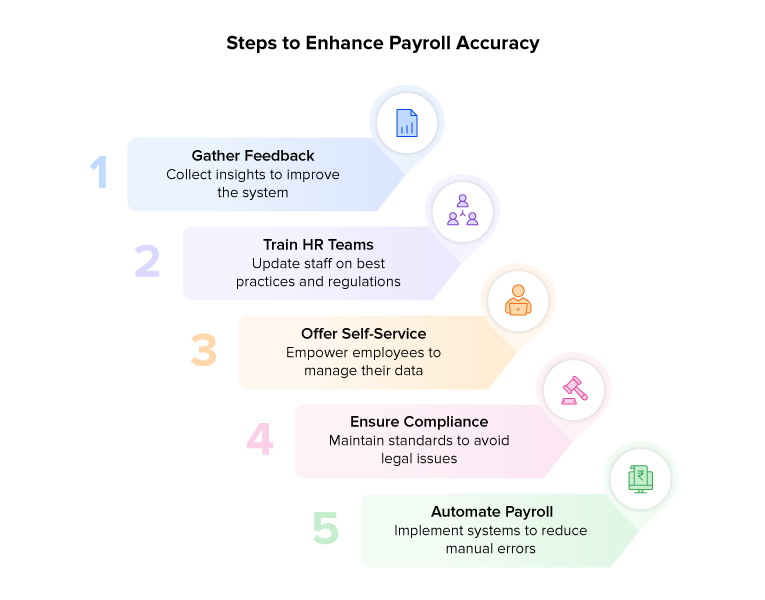Is Your Payroll Process Costing You Top Talent?

Table of Contents
Payroll errors can significantly impact employee satisfaction, compliance, and operational efficiency. Despite caution, organizations may face payroll irregularities, leading to mistrust, reputational damage, and costly audits. Common payroll mistakes include inaccurate salary calculations, compliance issues resulting from non-adherence to tax laws or labor regulations, data management errors leading to payroll discrepancies, and timeliness problems that result in late or missed payments.
Employee benefits errors, such as mistakes in enrollment, deductions, or contributions, can also lead to employee dissatisfaction. Early detection and correction of these issues are crucial to maintaining employee trust, ensuring compliance, and optimizing operational efficiency. By recognizing and addressing these common payroll problems, organizations can enhance their payroll process and Talent retention, thereby reducing risks and fostering a positive work environment.
In this article, we will provide a detailed review of how payroll processes and talent retention are interrelated, so that companies must recognize and address them.

Why Payroll Process Matters in Talent Retention?
In an organization, paying employees properly and promptly fosters trust and openness among all employees. When an organization has established a clear payroll procedure, employees can see that they are valued and cared for financially. Thus, in return, this can make them more satisfied and loyal. A well-managed payroll processes are directly linked; errors in one can negatively affect the other.
A properly functioning talent retention with payroll system ensures that employees are paid fairly for their abilities and experience. A firm is more likely to retain its employees if the compensation is seen as competitive and meets what employees expect. On the other hand, a sense of unfair or inadequate compensation can lead to dissatisfaction and prompt individuals to leave.
A modern payroll system benefits in that it provides flexibility and makes adjustments easier. As a result, firms can give each employee a remuneration and benefits package that suits them best. Payroll software today often features self-service areas that allow employees to view their pay, tax information, and benefits. As a result, this feature will enable employees to be more productive and manage their financial details.
Workers can also provide feedback to share their opinions about their salaries, benefits, and overall job satisfaction. Regularly gathering and implementing employee feedback into action can demonstrate that companies are committed to their employees’ well-being.
Consequently, when talent retention with payroll is done well and honestly, employees are more likely to trust, be satisfied with, and stay loyal to their employer. As a result, retaining employees becomes possible, costs associated with turnover are reduced, and the organization becomes more secure and prosperous.
What are the Common Payroll Process Mistakes that Drive Talent Away
Employers must prioritize the most prevalent payroll inconsistencies to avoid legal or employee impacts. Here are some common mistakes often encountered during payroll processing.
Delayed Salary Disbursements
It is an organization’s responsibility to pay employees’ salaries on time. Delays in salary payments or payroll mistakes resulting from inefficient payroll operations or cash flow concerns can negatively impact employee trust and satisfaction. Employers may ensure timely payments by implementing dependable payroll systems. Also, keep track of your cash flow and have a backup plan in place for any unexpected delays.
Misclassification of Employees or Incorrect Deductions
Employers may misclassify employees to save money on taxes, but this practice can result in severe fines. For example, employee misclassification of independent workers may impact their income, benefits eligibility, and tax deductions. Errors in deductions can result in payroll errors, making accuracy crucial.
Errors in Bonuses, Overtime, or Tax Withholdings
Several payroll errors can occur in an organization. Miscalculation of bonuses, overtime, or tax withholdings is most common. Benefits are an integral part of the overall compensation package. However, erroneous deductions for health insurance, retirement programs, and other benefits are a significant source of pay disparity. Overtime pay miscalculations can result from calculation errors, labor regulation misunderstandings, or insufficient tracking, leading to payroll errors. Companies must adhere to government labor and income regulations, while employees must comply with tax rules.
Lack of Payroll Transparency and Employee Access to Payslips
According to Zippia’s data, retention increases by 30% in an organization due to transparency. This is why a lack of transparency in payroll may result in a range of mistakes and difficulties, ultimately leading to mistrust between employees and employers. When payroll systems are unclear, it can result in inaccurate computations, missed deadlines, limited access to payslips, and difficulties addressing discrepancies. This lack of transparency can also harm employee morale, as they may believe their remuneration is not being handled properly or honestly.

How to Fix It: Steps to Make Payroll Work for Talent Retention
To prevent repeated payroll mistakes, pinpoint the root cause and implement corrective payroll procedures. Here are a few payroll mistakes to avoid:

Automate Payroll to Reduce Manual Errors
Implementing a payroll automation system helps resolve the majority of your payroll errors. Modern systems integrate AI and machine learning to eliminate human error and streamline HR and payroll procedures. Furthermore, payroll software can automatically calculate taxes, apply deductions, and generate reports, significantly reducing the likelihood of payroll errors.
Ensure Compliance and Accuracy with Audit Trails
Frequent payment compliance and proper payroll procedures can greatly minimize payroll errors. Businesses that precisely calculate and pay salaries, taxes, and other deductions face a low risk of insufficient payments, over payments, and other compliance concerns. Thus, the payroll security standards are maintained.
Offer Self-Service Access to Payroll Data
Employee self-service (ESS) can help reduce payroll mistakes. This can be achieved by enabling employees to review their payroll information, identify inconsistencies, and promptly report any issues. This payroll self-service can lighten the effort on payroll workers while improving overall accuracy.
Train HR and Payroll Teams on Best Practices
HR payroll training for staff should continue to help them understand new regulations, effective practices to build the HR team, and technology. Ensure that payroll employees are required to regularly update their knowledge of tax regulations, employment laws, and software changes.
Regular Feedback
Receiving regular employee feedback helps identify any issues, enhances the payroll system, and fosters confidence among all employees. Companies can make payroll more accurate by asking employees to check their pay stubs, report any issues, and ask about anything unclear beforehand. Utilize a payroll management system to receive regular feedback and gain valuable employee insights.
How does a Strong Payroll Process System Benefit Talent Management?
A well-executed payroll software ensures Talent Management can reward employees accurately and promptly, which improves staff satisfaction, helps retain employees, and boosts the organization’s overall performance. As a result, employees are more likely to remain engaged and motivated, which is crucial for effective hiring and development. Here are some Payroll system benefits to know:
Builds Employee Trust and Satisfaction
Correct, timely, and clear payroll management encourages employees to trust and be satisfied with the company. As a result, employees feel valued by the company, which leads to improved morale and a lower turnover rate. When employees understand the calculation of their pay, the timing of payments, and receive it accurately, they are more likely to trust and feel satisfied.
Reduces Turnover and Increases Loyalty
Accurate and timely payroll administration boosts employee satisfaction, reduces turnover, and fosters loyalty by demonstrating appreciation and respect for employees. This is because accurate, on-time payments, as well as clear information concerning compensation, promote trust and a sense of security. Thus, helping in retaining employees.
Supports Fair Compensation Practices
Effective payroll process and talent retention are necessary for a fair and transparent compensation process. By ensuring accurate and timely payment, providing clear and concise payslips, and adhering to relevant tax laws and labor regulations, organizations can foster trust and confidence among their employees, promoting a positive and productive work environment.
Enhances Employer Branding and Hiring Success
Better talent retention, payroll administration, enhanced corporate branding, and hiring success by providing a positive employee experience and conveying professionalism and efficiency. This results in higher employee satisfaction, retention, and, ultimately, a better ability to attract top talent. This can also be considered an effective Employee Retention Strategy within the organization.

Conclusion
Payroll errors may seem minor, but they often go unnoticed, causing costly, long-term damage to businesses. Consequently, these mistakes may create a chain reaction, escalating over time and ultimately inflicting substantial damage to your business. From compliance issues to employee dissatisfaction, a flawed payroll process can silently impact retention and morale. To avoid these pitfalls, it’s essential to identify recurring issues, refine procedures, and adopt reliable tools.
If your current system is falling short, it may be time to evaluate your talent retention with payroll. A platform like factoHR can help streamline processes, ensure compliance, and minimize human error, making payroll management both efficient and dependable.
Grow your business with factoHR today
Focus on the significant decision-making tasks, transfer all your common repetitive HR tasks to factoHR and see the things falling into their place.

© 2026 Copyright factoHR


